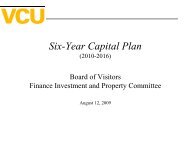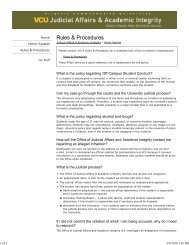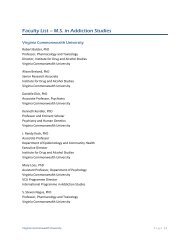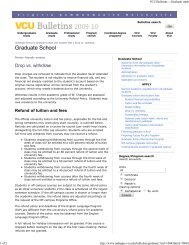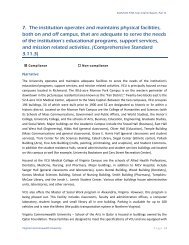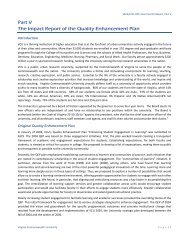4. The institution identifies expected outcomes, assesses the extent ...
4. The institution identifies expected outcomes, assesses the extent ...
4. The institution identifies expected outcomes, assesses the extent ...
Create successful ePaper yourself
Turn your PDF publications into a flip-book with our unique Google optimized e-Paper software.
SACS/COC Fifth-Year Interim Report, Part III.<br />
Dr. Laurie Carter, Director of Oral and Maxillofacial Radiology, represents <strong>the</strong> Dentistry, M.S.D. program,<br />
and Ms. Kim Isringhausen, M.P.H., Director of Dental Hygiene and Preceptorship Programs, represents<br />
<strong>the</strong> Dental Hygiene, B.S. program. <strong>The</strong> D.D.S. and M.S.D. programs have external accrediting bodies and<br />
both met <strong>the</strong>ir external accreditation standards related to student learning. <strong>The</strong> Dentistry, D.D.S. met<br />
<strong>the</strong> Commission on Dental Accreditation’s related standard (Standard 2-25) on student competencies<br />
and <strong>the</strong> Dentistry, M.S.D. met <strong>the</strong> Commission on Dental Accreditation’s related standards (Standard 1<br />
and Standard 1.3) on <strong>outcomes</strong> assessment and measurement of student achievement in <strong>the</strong>ir most<br />
recent reviews.<br />
<strong>The</strong> three Dentistry programs have complete and up-to-date assessment plans with well-written goals,<br />
objectives, measures, targets, and findings. <strong>The</strong> external review of <strong>the</strong> plans shows that <strong>the</strong> three<br />
programs’ plans are strong and each program has shown assessment plan improvements since <strong>the</strong><br />
2007–2008 assessment reporting cycle (see School of Dentistry scorecard). <strong>The</strong> B.S. reporting shows<br />
that <strong>the</strong> assessment results are used for continuous improvement. For example, <strong>the</strong> faculty report that<br />
<strong>the</strong>y “identified evaluation mechanisms by levels of assessment (novice, beginner, competent)” and tied<br />
<strong>the</strong>se to <strong>the</strong>ir courses and competency documents. <strong>The</strong> M.S.D. plan shows that faculty will focus on <strong>the</strong><br />
need for multiple reviewers and inter-rater reliability. <strong>The</strong> D.D.S. uses both direct measures (e.g., board<br />
exams) and indirect measures (faculty survey, graduate surveys) to assess student learning <strong>outcomes</strong>.<br />
<strong>The</strong> Office of Assessment’s future work with <strong>the</strong> School of Dentistry will focus on clearly separating<br />
programmatic <strong>outcomes</strong> from student learning <strong>outcomes</strong> and developing additional direct measures for<br />
student learning in <strong>the</strong> B.S. and M.S.D. programs.<br />
School of Education<br />
<strong>The</strong> School of Education offers 20 degrees. Programs in <strong>the</strong> School met, in <strong>the</strong>ir most recent reviews,<br />
<strong>the</strong> standards for assessment of student learning established by <strong>the</strong> National Council for <strong>the</strong><br />
Accreditation of Teacher Education (NCATE; Standards 1 and 2), Council for Accreditation of Counseling<br />
and Related Educational Programs (CACREP; Section I.AA), and <strong>the</strong> Commission on Accreditation of<br />
Athletic Training Education (CAATE; Sections H1, H2, and H3). <strong>The</strong> School has one representative on <strong>the</strong><br />
VCU Assessment Council, Dr. Susan McKelvey, Director of Assessment, School of Education. A number<br />
of degree programs in <strong>the</strong> School, particularly <strong>the</strong> Secondary Education, M.T. and <strong>the</strong> Special Education,<br />
M.Ed., have created assessment plans for concentrations within <strong>the</strong> degree. According to our external<br />
consultant, all programs in <strong>the</strong> School of Education meet or exceed VCU’s threshold requirements for<br />
assessing student learning (see School of Education scorecard).<br />
<strong>The</strong> School of Education has committed substantial resources to assessment. <strong>The</strong> School has its own<br />
Office of Assessment, which is staffed by Dr. McKelvey and Mr. David Spivey, who serves as Data<br />
Manager. In addition to assessment reporting in WEAVEonline, all programs in <strong>the</strong> School that are<br />
accredited by NCATE make extensive use of rGrade TM to support <strong>the</strong>ir accreditation activities. rGrade is<br />
a web-based assessment system that allows faculty to embed rubrics at <strong>the</strong> course level, receive<br />
uploaded assignments from individual students, and use <strong>the</strong> rubrics to grade assignments online. In<br />
addition, rGrade houses data from standardized tests (e.g., PRAXIS I and II, and <strong>the</strong> Virginia Reading<br />
Assessment) and from measures that are not course-based (e.g., clinical evaluations, comprehensive<br />
Virginia Commonwealth University P a g e | 16



